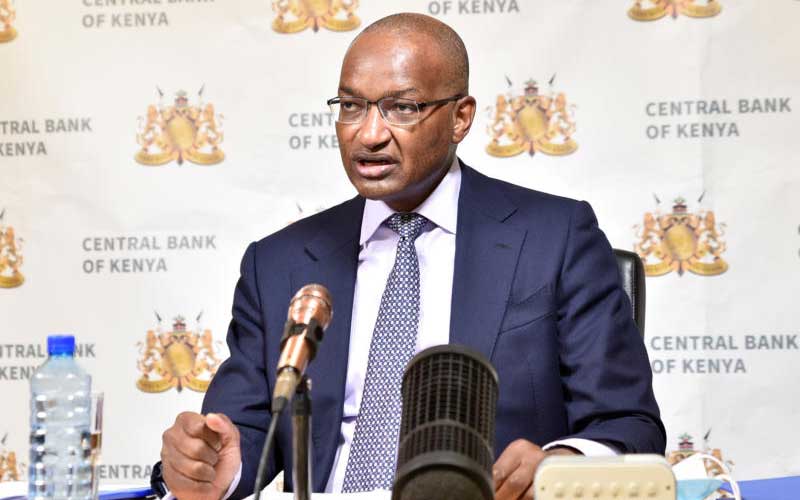
CBK Governor Patrick Njoroge at a past press briefing. [File, Standard]
The government is pushing for interoperability among digital financial service providers to encourage the adoption of cashless transactions.
This is according to the latest Central Bank of Kenya (CBK) policy document detailing new proposals that could significantly affect banks, mobile telecommunication firms and financial technology firms (fintechs) operating in the country.
“Though the industry moved to enable interoperability of mobile wallets in 2018, this is limited to only person to person (P2P) payments, and is yet to be expanded to both merchant and agent interoperability and even to work seamlessly at P2P,” explains the CBK in the draft report dubbed Kenya National Payments System 2021-2025.
“If effected, this will enable mobile money users of any network to cash in or cash out from any mobile money agent irrespective of the network they represent and to make merchant payments at any merchant no matter the network with which the merchant has a mobile money account or payment instrument,” states the policy.
The new proposals come on the back of a major spike in the use of digital financial services in the country owing to Covi-19.
According to CBK, between February and October 2020, volumes of P2P payments increased by 87 per cent, with an additional 2.8 million customers using mobile payments.
Volumes and values of transactions below Sh1,000 increased by 114 per cent and 200 per cent respectively during the same period.
Earlier this month, CBK Governor Patrick Njoroge said the pandemic has given financial service providers a new urgency of adopting sustainable finance practices.
“As we move forward, agility will be imperative particularly for incumbent institutions as they respond to changing customer preferences for anytime-anywhere services,” he said during the virtual Afro-Asian Fintech Festival earlier in the month.
“Even before the pandemic, incumbent banks and telecommunication companies had started to develop partnerships with agile fintech companies. This trend will have to be accelerated in a safe and sustainable manner as we build back.”
The CBK’s Kenya National Payments System 2021-2025 further proposes a review of the charges and tariffs to ensure more low income consumers afford the crucial services.
“While the recent improvements in various payments channels have been commendable, the same has not been reflected in terms of pricing of various payments services,” explains the draft document.
“Aside from the Covid-19 support measures that were designed to cushion the economy, the benefits of digitisation of payments are yet to be fully passed on to customers.”
It noted; “Prices and tariffs of some payment services are high in relative terms, while others are too complex to be understood by the average consumer.”
CBK says the lack of effective complaints mechanisms for consumers on digital financial channels has undermined trust.
According to the 2019 FinAccess Household Survey by the CBK, Kenya National Bureau of Statistics and the Financial Sector Deepening (FSD), cash remains king for a majority of payments even with gains made towards digitisation.
According to the survey, formal financial inclusion has risen to 82.9 per cent, up from 26.7 per cent in 2006, while complete exclusion has narrowed to 11.0 per cent down from 41.3 per cent in 2006.
Gaps in formal financial access between the genders and rural and urban dwellers have also declined to 6 and 14 per cent, down from 11 and 12 per cent, respectively.
The study also found rising concern that the cost of digital finance services was eroding these gains, pushing more low income earners in the country to borrow and save in informal channels such as investment groups (chamas).
“Despite the progress made so far, affordability and consumer protection issues such as unexpected charges remain barriers to formal service access,” explained the report in part.
“Even more notable is the considerable modesty of the developmental impact of formal financial access. Many Kenyans have formal accounts in various forms, but these accounts are rarely used because they are not solving real day-to-day problems for many households, smaller and micro-scale businesses and farmers.”
Service providers have been making periodic reviews to their pricing in recent months. Last week, Safaricom announced new tariffs for M-Pesa with costs going down by up to 45 per cent.
“This is in consideration of the expiry of the period for the zero-rated M-Pesa transactions and the ongoing Covid-19 and economic circumstances,” said the company last week.
“These tariff reductions will affect more than 90 per cent of all customer transactions when sending money.” It will now cost Sh6 to send between Sh101 and Sh500, down from Sh11 while transactions of between Sh1,501 and Sh2,500 will cost Sh32 down from Sh41.
Airtel has also announced new charges.
Airtel Networks Kenya Ltd Managing Director Prasanta Das Sarma said customers will from January 1 transfer up to Sh100 to any network at no cost.




No comments :
Post a Comment